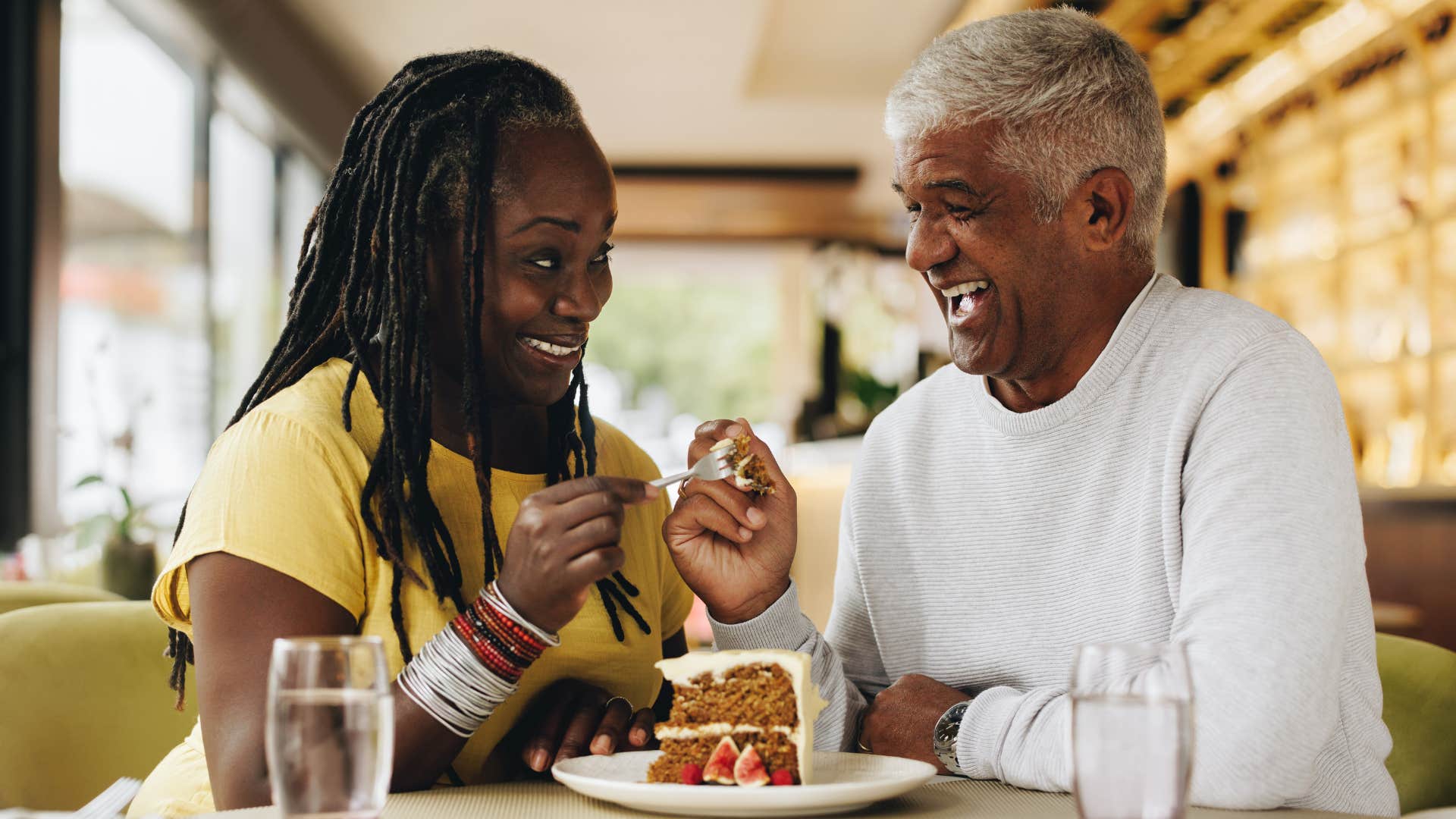Couples Who Truly Love Each Other Use These 7 Phrases On A Regular Basis
Appreciative words have the power to strengthen an emotional bond.
 Chermiti Mohamed from Pexels | Canva Pro
Chermiti Mohamed from Pexels | Canva Pro In a relationship, words convey many meanings. They can be direct or subtle. They can show love or hate. The tone of voice of the person saying the words can promote harmony or hostility. To recast a maxim that's going around these days, "Words matter."
To improve your communication skills and nurture your relationship, there are certain phrases couples should feel comfortable saying, as they are ones spoken by couples who genuinely love each other.
Here are seven phrases couples who truly love each other use on a regular basis:
1. 'What can I do?'
 ITimBo via Shutterstock
ITimBo via Shutterstock
This phrase worked well with Frank and Claire Underwood in the political drama House of Cards. When Claire came home after a difficult day at work, no matter how difficult Frank's day was, he would ask her, "What can I do?"
He said it with caring, compassion, tenderness, and, most importantly, in truthfulness. It showed that Frank (even though he was, you know, a murderer at times) had a good store of emotional intelligence. Though Claire's response was almost always, "Nothing," the words of caring help tremendously.
Saying, "What can I do?" has a wonderful effect on a marriage. When the words are said with deep honesty, they build your relationship.
2. 'What do you mean by that?'
 Mix Tape via Shutterstock
Mix Tape via Shutterstock
Relationships can be the Tower of Babel, in terms of speaking and not understanding the other person, even when we've lived with the person for a very long time. We make assumptions as to what the other person means by projecting our values and history on the words we hear. These misunderstandings are surprisingly frequent.
In her book Taking the War Out of Our Words, Sharon Strand Ellison explains how to formulate open-ended, non-assumptive questions that don't feel or sound like interrogations, but which can unearth what the other person is thinking and feeling.
You can find something out about your partner when you say, "What do you mean by that?" Replace the word "that" with the word or phrase used by your partner.
Say and communicate it in a very soothing, non-threatening way. Just try to find out what your partner means. You may already be annoyed, so take a breath, assume the best, and ask the question in a musing, vulnerable, unguarded way.
If you ask it in a suspicious or aggressive tone of voice, it won't work. When it does work, it opens up new lines of communication between you and your partner.
3. 'Thank you'
 Jacob Lund via Shutterstock
Jacob Lund via Shutterstock
This one seems so easy and simple. And yet, we don't do this enough with our partners. We let our busy lives get in the way of keeping our relationship strong, neglecting the most important words we can say to make our partners feel appreciated.
Lawyer and mediator John Fiske believes that all marriages rise and fall on two factors: "control" and "acknowledgment." "Acknowledgement" means giving your partner the appreciation they deserve, daily. It sounds sappy, but it's really important to communicate this.
But when you say "thank you," say it with a generous and appreciative heart. Our partners do so many things that we should thank them for!
4. 'Would you like to drive now?'
 Soloviova Liudmyla via Shutterstock
Soloviova Liudmyla via Shutterstock
It's very typical for long-term partners to fight about control in a car; after all, your life depends on how well you or your partner drives.
The driving issues may include:
- What is the best route to take? (Sound familiar?)
- Tailgating (Anger in marriage)
- Signaling every turn (Partners have different standards in terms of following rules)
- Parallel parking (People come from different backgrounds — the rural spouse may not be so good at doing this)
- Backing up the car (Sometimes you just have to trust your partner)
The upshot is that all the driving disputes mirror typical marital disputes. Many of them revolve around the issue of "control." (Thank you, John Fiske.) Knowing that your spouse doesn't want to get killed in the car as much as you do helps.
5. 'Would you like me to help?'
 fizkes via Shutterstock
fizkes via Shutterstock
This little phrase can never be said enough by couples who truly love each other. You may think your partner doesn't need help. And maybe your partner doesn't. But you'll be surprised at how often the answer is, "Yes, I would appreciate it."
Close personal relationships thrive and fall on something called "contribution." Helping your partner is a contribution you can make. And just asking the question, no matter the answer, is a way of showing that you want to contribute.
People feel good about their relationships if they feel the other partner is contributing as much as they are. Conversely, people are dissatisfied with their relationships if they feel the other person is not pulling their weight.
Most of the complaints and bad feelings in a committed partnership involve the issue of contribution, so don't let this important issue remain unsaid. Ask your partner if she or he would like your help.
6. 'What would you like to do?'
 Andrii Nekrasov via Shutterstock
Andrii Nekrasov via Shutterstock
Here's another important phrase the strongest couples use. Bear in mind that it has to do with generosity, another essential nourishment of a committed relationship.
It doesn't take a rocket scientist to know that the more generous you are, the more satisfied your partner will be. And yet, many recent academics are doing just that — conducting studies on the importance of generosity in marriages, as shown in research from the Journal of Marriage and Family.
It seems that when the relationship is no longer new, we tend to promote our wishes and desires over our partner's own. Think about it. Are you ever guilty as charged of that behavior? Everyone is.
So, at least a couple of times a day, if there is an occasion, say this phrase to your partner. You might be surprised at the answer, and maybe you'll even have a new adventure and get out of a rut.
7. 'Yes, dear'
 Andrii Nekrasov via Shutterstock
Andrii Nekrasov via Shutterstock
When your partner says something to you, start your response with, "Yes, dear." Some call this "priming the pump" or "patterning loving behavior." If you use it, be very careful not to say it sarcastically.
But if you say it sincerely, the "dear" is said and received. It's a form of verbal affection, a subtle way of saying, "I love you." If you are a "dear," you are loved. "Sweetheart" is another of these love triggers.
Many couples have their terms of endearment, so just use the one that has come naturally to you in the relationship. And be generous about saying them.
In a marriage or relationship, words are the medium. Words, and the way you say them, carry messages back and forth between partners that affect emotions and connection. They can make it thrive or destroy it.
All words and feelings, good and bad, exist in a long-term marriage or relationship. They have to. That's the reality. But it's the work of the partners to guide their language into words that will help their relationship thrive and grow, rather than corrode and wither.
So, it's time to start saying these words and phrases often and sincerely. You will be amazed at how they can improve the level of tenderness you and your partner feel towards each other. It can have a domino effect on your relationship.
Laurie Israel is an attorney, mediator, and contributor to YourTango. She uses mediation to help people preserve and improve their marriages. Her writing has appeared in the Wall Street Journal, Huffington Post, and the New York Times.

